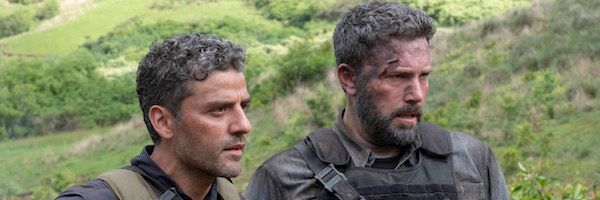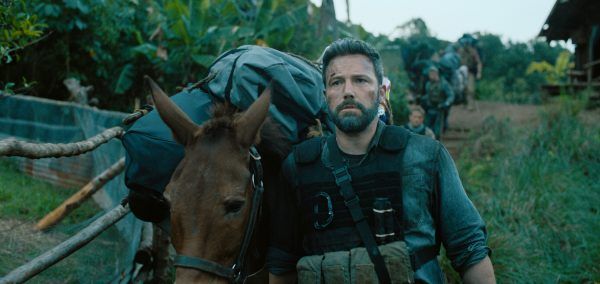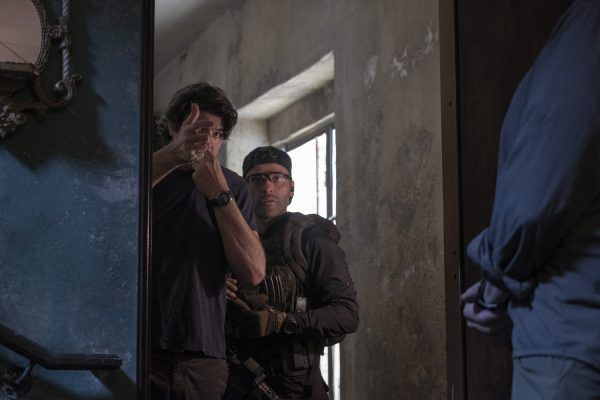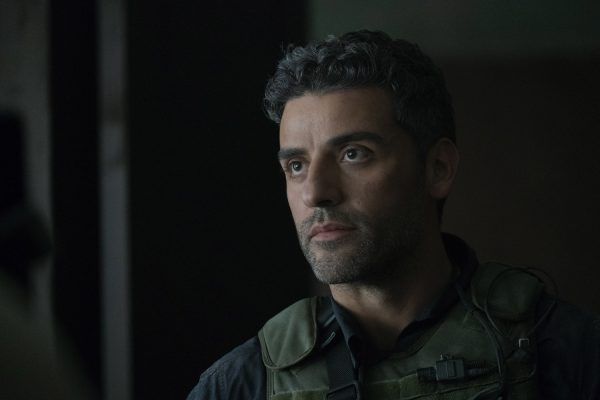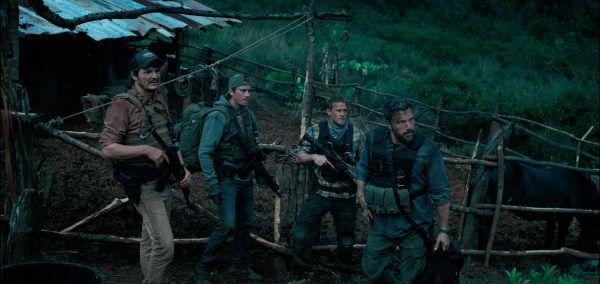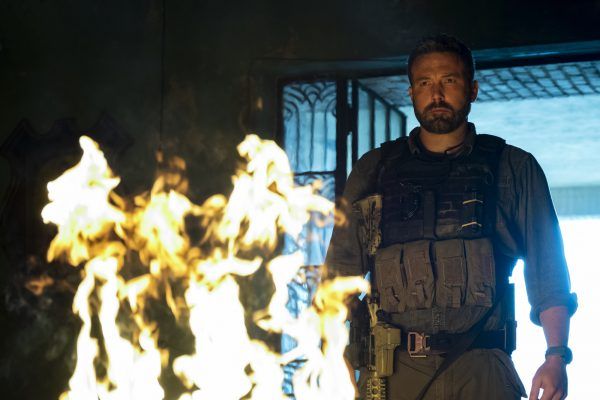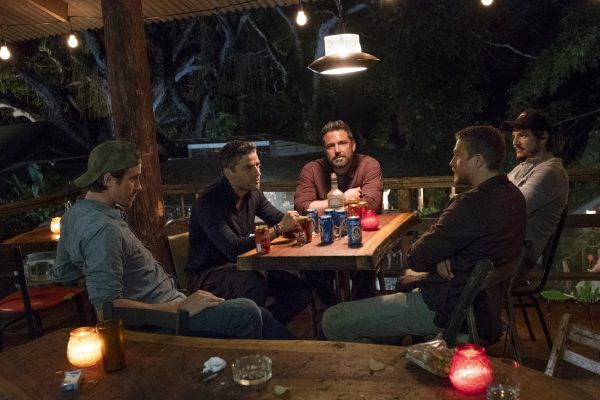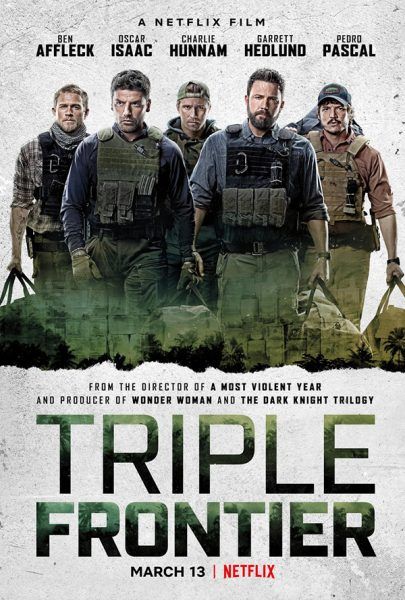Spoilers for Triple Frontier follow below.
A month after Netflix's Spanish-language drama Roma took home three Oscars (including Best Director), the streaming service just released a star-studded action-thriller that’s been in development in Hollywood for a decade. Triple Frontier started as the next project from The Hurt Locker writer Mark Boal and director Kathryn Bigelow, but despite attracting A-list talent like Will Smith over the years, the film couldn’t get made. Until Netflix stepped in.
The finished version hails from All Is Lost and A Most Violent Year director J.C. Chandor (who also co-wrote the script) and finds Oscar Isaac leading a team of former U.S. soldiers into the Columbian jungle to steal a fortune from a drug lord. But if the film begins as a sort of macho traditional action movie in the vein of Black Hawk Down, as the story unfolds, it becomes clear that Chandor is interested in unpacking what makes these men tick.
That’s abundantly clear in the character of Tom “Redfly” Davis, played by Ben Affleck. Davis is the plan-master of the group, but back home he’s an alcoholic veteran who's stuck trying to sell condos and is drowning in a mountain of bills. He’s hesitant to join the mission and cautious of overextending, but once the team sees for themselves how much money is on the table, a switch seems to go off in Redfly’s head and he starts being careless.
That extends to a tense confrontation after the team’s helicopter crashes with all the money, and Redfly shoots and kills various villagers who are simply trying to defend their field. This decision rankles the team and ultimately spells doom for Redfly when one of the dead villagers’ sons tracks them down and shoots him in the head, killing the co-lead character about three-quarters of the way through the movie.
Killing off one of the main characters before the film’s finale is a shocking turn of events, and when Collider spoke with Affleck and Chandor at the press day for Triple Frontier, we asked how this big twist came to be. As it turns out, it was Affleck’s idea, and Chandor says he brought it up during their first meeting:
“When I first read the script it was a secondary character [who got killed], I can’t even remember which one of the other guys it was. It was someone else… It was actually in meeting with Ben for the first time, he suggested it. He said would you ever be willing to do that? I had actually moved it to a different character than the one that I originally read [in Mark Boal’s draft of the script]. I won’t get into who, but it was to another character and it was very secondary. Ben said, ‘Would you ever be willing to, if I got the studio to agree to it, to allow that to be me?’"
Chandor says Affleck had previously wanted to kill off a main character in one of his other films, but the studio wouldn’t allow it:
“You can ask him about this, but I think he had a version of a movie that he might have directed where he wanted to do something like this before and wasn’t able to because of the studio. He had always regretted that. He suggested it to me and I left his office that day and I was like, ‘YES!’ I realized it was so neat that instead of it being the guy that should have died, it was the guy that shouldn’t have, in a way. Even though he’s the leader, and he should have known better.”
Affleck likened the impact of his character’s death to the film To Live and Die in L.A.:
“I thought that would be interesting and I wanted to see somebody actually pay a price for what happened. I always liked To Live and Die in L.A., how Bill Peterson’s character died. It kind of takes you off guard. I wanted to do the same thing. This is a little bit later in the movie than Bill Peterson’s character, but it highlights the risk to people’s lives. It focuses on the mortality question and theme, which I think is really interesting.”
Clearly the movie doesn’t end with Redfly’s death. Santiago (Isaac), William (Charlie Hunnam), Ben (Garrett Hedlund), and Francisco (Pedro Pascal) make it to safety, but not without having to throw the majority of the money into a giant crevasse. They all agree to give what remains—$5 million—to Redfly’s family, but at the very end of the film, William hands Santiago the coordinates to the rest of the money, and a pulsing guitar and drums kick in, playing louder and louder as Santiago walks into a crowd.
So what’s with the coordinates, and are we to believe Santiago will now go after the money after having decided to give it all up? Chandor had a very specific intention with this final moment:
“There was always an element of those coordinates but it was done in a different way that I didn’t think, structurally, worked. What I was trying to do was, from the time that Ben, ‘Redfly’, dies, they self-correct as characters. They’re like, ‘Woah, we got off line here,’ a little bit. It’s that whole final 15 minutes before that big chase at the end. They’re kind of realigning themselves, which I think is awesome. What I love about the way it ends right now is—and the music is what I love about it. It’s that second piece of Metallica that starts coming up right as he’s taking the piece of paper out of his thing. What I love about it is the testosterone that got him in trouble in the first scene, you think they’ve learned their lesson. They have a real moment on the top of the hill, their buddy dies, and it’s the testosterone that gets men with guns in so much trouble, and it starts coming out again the minute he takes that piece of paper out. It’s almost as if they have sort of learned nothing (laughs). Which, I think is very human.
It was a thing that was in the script and in a way it felt a little Hollywood-y, but then when I turned it on its toes, and realized if you use this as actually the thing that makes them human again, and it’s what human nature would want to do. You know, you can’t leave $100 million in the bottom of a ditch, that’s sacrilegious. So, I just love the way it creeps back in at the end there.”
Indeed, masculinity is clearly a major theme throughout Triple Frontier, and one has to wonder if some of the more bro-y tropes that Chandor brings in are deliberate, in that once the characters get into the jungle, guns in hand, a fortune on the line, they start to lose their heads. In that respect, the final scene is both intriguing but also quite dismal—is Santiago going to risk his and others’ lives again for money? That, however, is the point, so you can’t really say that ending isn’t in keeping with the tone of the rest of the film.
To err is human, as they say.

